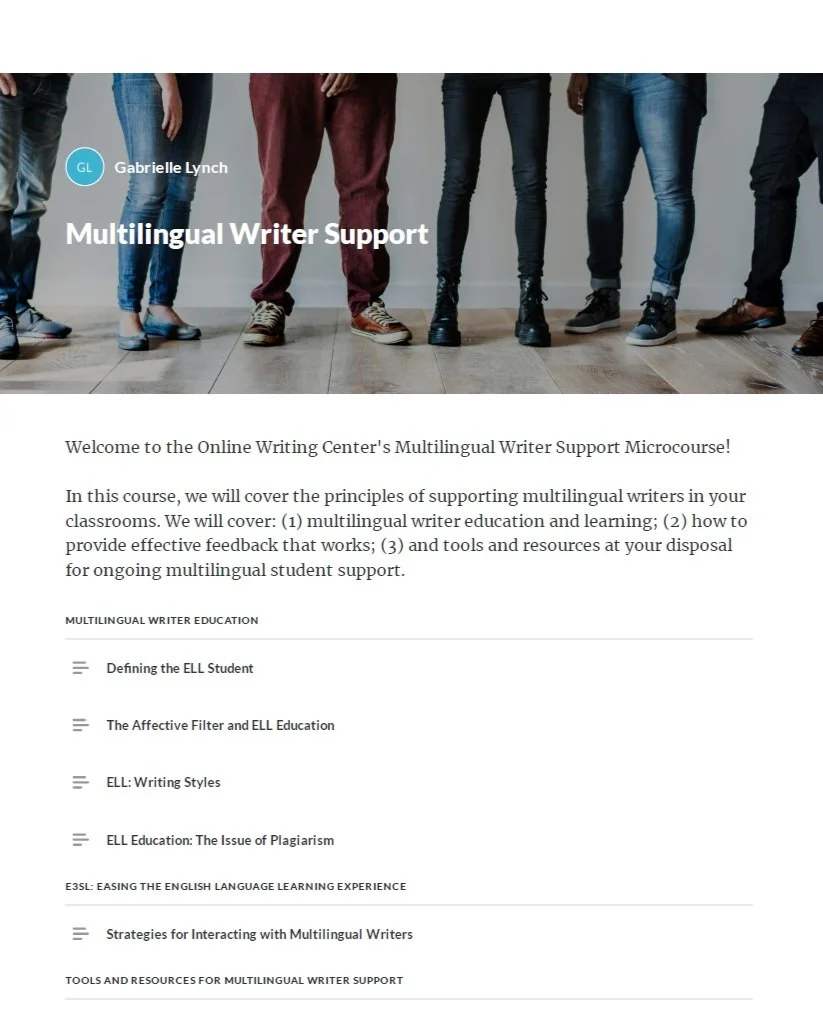
E3SL: Easing the English Education Experience
TCSPP Inclusion, Diversity, Equity, and Access (IDEA) Grant Report
E3SL is a program designed to provide multilingual students with the support they need to be successful in their academic pursuits at TCSPP. To do this, the program works two-fold: (1) providing an interactive immersive English language learning support module, and (2) providing a professional development tool to assist instructors in learning how to provide writing feedback to support multilingual writers in the classroom. This two-pronged approach is necessary to truly create an inclusive community where multilingual writers can feel understood, respected, and supported in their academic pursuits. The module will provide self-paced lessons the students can use to receive feedback and advance in their learning. This will be paired with the automatic feedback tool and accompanying professional development for instructors, allowing them to give more substantial and informed feedback to the students to further their progress.
Meet the Team
-

Gabrielle Lynch, MA, MSE
Online Writing Center | General Education
Writing & ESL Specialist | Adjunct Faculty
-

Heidi Marshall, PhD
GOAL 2: Prepare for Generational, Global, and Regional Population and Demographic Changes
Today’s US education system comprises roughly 5 million English language learners (ELLs), about 10% of all public school students, nearly double the percentage of a decade ago and continuously increasing (NEA, 2019; Quintero & Hansen, 2017). To support this growing population and their higher education needs, the American Council on Education’s (ACE, 2021) recent report with guidelines for higher education institutions to use to support greater inclusion and success of international students. The ACE suggests five tenets designed to create better support systems that protect and develop diversity and inclusion in academic institutions: Sustainability, Responsiveness, Networking, Humanism, and Equity. The E3SL program suggested herein fully manifests all five of these components.
Strategy 2: Strengthened, Developed, and Expanded Academic and Student Support Structures and Services that Meet Evolving Student and Community Needs
The E3SL program fills a gap in the TCSPP support services for multilingual students. Despite enrolling hundreds of international students, there is no centralized, interactive support for students who do not speak English as a first language. Only the Online Campus specifically employs a multilingual writing specialist. The E3SL program provides all of the Online Campus Writing Center’s multilingual writing support in an interactive 24/7 format that supports the multilingual community as it grows with consistent and specialized support designed to help multilingual writers successfully integrate feedback. The modules provide the contrast between students’ native linguistic cultural expectations and academic English that students need to fully linguistically acculturate to the expectations of Western higher education without detrimental ‘replacement’ or ‘correctional’ ideology.
Sample: The E3SL Grammar Module
Strategy 3: Develop and Bolster the Infrastructure and Support Needed to Reduce Inequities in Outcomes Across Diverse Racial and Ethnic Populations, Socioeconomic Statuses, and People with Different Abilities Through Modernizing Services, Practices, and Policies
Despite the multilingual student population increasing nearly trifold over the past few decades in the United States, there have not been corresponding changes in how classrooms or higher education instructors are trained to support their multilingual students beyond the classic writing center referral. This has left a large gap in equity in education for multilingual students, who do not receive the same level of instruction or support resources as their native English speaking counterparts. The companion instructor course for the E3SL program provides faculty with in-depth instruction on how to support their multilingual students in the classroom, how to use the extensive library of support resources provided by the Online Campus Writing Center, and how to use the Online Writing Center’s automatized feedback tool to provide evidence-based feedback on students’ assignments.







